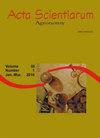Mycorrhization of strawberry plantlets potentiates the synthesis of phytochemicals during ex vitro acclimatization
IF 1.2
4区 农林科学
Q3 AGRONOMY
引用次数: 1
Abstract
Ex vitro strawberry plantlets from micropropagation and coinoculated with arbuscular mycorrhizal fungi (AMF) and biochar can provide beneficial health effects. In the present study, we evaluated the effects of different proportions of biochar in the presence and absence of AMF on the production of secondary metabolites in the leaves and roots of strawberry plantlets during ex vitro acclimatization. Additionally, the enzymatic activity of the substrate enriched with AMF and biochar was analyzed. The experiment consisted of the control (absence of the mycorrhizal community) and four biochar proportions (0, 3, 6, and 9% of the volume of the container) coinoculated with AMF. Plantlets produced on substrates enriched with AMF showed higher levels of polyphenols, flavonoids, phenolic acids, and tannins in the tissues analyzed than control plantlets. The combination of AMF and 9% biochar increased the content of total flavonoids in the leaves of strawberry plantlets and increased the activity of phosphatase. The substrate with up to 6% biochar and mycorrhizae showed increased β-glucosidase activity. In conclusion, mycorrhizae are excellent tools to improve the phytochemical quality of strawberry plantlets acclimatized ex vitro. The association between host plants, mycorrhizal symbionts, and bioactivators of these fungi potentiates properties beneficial to health, which can be exploited efficiently in sustainable agriculture.在离体驯化过程中,草莓植株的菌根化增强了植物化学物质的合成
草莓离体苗与丛枝菌根真菌(AMF)和生物炭共接种具有良好的保健效果。在本研究中,我们评估了在存在和不存在AMF的情况下,不同比例的生物炭对草莓离体驯化过程中叶片和根系次生代谢物产生的影响。此外,还分析了AMF和生物炭富集的底物的酶活性。试验由对照(菌根群落缺失)和四种生物炭比例(占容器体积的0、3、6和9%)共接种AMF组成。在富含AMF的基质上产生的植株,其组织中多酚、类黄酮、酚酸和单宁的含量高于对照植株。AMF与9%生物炭的组合处理提高了草莓幼苗叶片总黄酮含量和磷酸酶活性。添加6%生物炭和菌根的底物β-葡萄糖苷酶活性增加。综上所述,菌根是提高草莓离体驯化植株化学品质的良好工具。寄主植物、菌根共生体和这些真菌的生物激活剂之间的联系增强了对健康有益的特性,可以在可持续农业中有效地利用。
本文章由计算机程序翻译,如有差异,请以英文原文为准。
求助全文
约1分钟内获得全文
求助全文
来源期刊

Acta Scientiarum. Agronomy.
Agricultural and Biological Sciences-Agronomy and Crop Science
CiteScore
2.40
自引率
0.00%
发文量
45
审稿时长
>12 weeks
期刊介绍:
The journal publishes original articles in all areas of Agronomy, including soil sciences, agricultural entomology, soil fertility and manuring, soil physics, physiology of cultivated plants, phytopathology, phyto-health, phytotechny, genesis, morphology and soil classification, management and conservation of soil, integrated management of plant pests, vegetal improvement, agricultural microbiology, agricultural parasitology, production and processing of seeds.
 求助内容:
求助内容: 应助结果提醒方式:
应助结果提醒方式:


